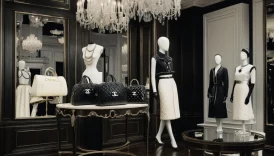Who Inspired the Story Behind Unilever?

- Who Inspired the Story Behind Unilever?
- The Founders of Unilever
- The Role of Early Innovations
- Lever's Soap Revolution
- Market Strategies in the 19th Century
- Social Responsibility Initiatives
- Arthur Hubert's Contributions
- The Influence of Global Events
- Adaptation During Economic Crises
- Post-war Expansion Strategies
- Frequently Asked Questions (The title must be written in English (US).
The story of Unilever is not just about a brand; it’s about visionary individuals whose dreams and ambitions shaped a global consumer goods giant. At the heart of this narrative are two remarkable men: William Hesketh Lever and Arthur Hubert. Their innovative ideas and entrepreneurial spirit paved the way for what we now know as Unilever, a company that has touched the lives of millions around the globe.
William Hesketh Lever, often referred to as the father of Unilever, was a man with a vision. He believed that cleanliness was not just a luxury but a necessity. This belief led to the creation of Sunlight Soap, a product that revolutionized hygiene practices in the early 20th century. Lever’s commitment to quality and affordability made soap accessible to the masses, transforming consumer behavior and setting a new standard in the industry.
On the other hand, Arthur Hubert played a crucial role in expanding Unilever’s horizons. His strategic vision and leadership helped diversify the company’s product lines and broaden its global reach. Together, Lever and Hubert created a legacy that was not only about profit but also about social responsibility. They understood that a successful business must also contribute positively to society, a principle that remains at the core of Unilever’s philosophy today.
| Key Figures | Contributions |
|---|---|
| William Hesketh Lever | Introduced Sunlight Soap, revolutionizing hygiene practices. |
| Arthur Hubert | Expanded product lines and global market presence. |
What makes the story of Unilever even more intriguing is how these founders adapted to the challenges of their time. They not only faced fierce competition but also significant global events that tested their resolve. Their ability to innovate and pivot during such times is a testament to their visionary leadership.
In conclusion, the inspirations behind Unilever are rooted in the groundbreaking ideas and social consciousness of its founders. Lever and Hubert were not just business leaders; they were pioneers who understood the importance of creating a brand that resonates with people’s lives. Their legacy continues to inspire future generations in the world of business.
The Founders of Unilever
Unilever’s journey began with two remarkable visionaries: William Hesketh Lever and Arthur Hubert. These men were not just founders; they were pioneers whose innovative ideas and entrepreneurial spirit transformed the consumer goods landscape. Imagine a world where basic hygiene was a luxury—Lever and Hubert changed that narrative forever. Their commitment to improving everyday life for consumers was the foundation upon which Unilever was built.
William Hesketh Lever, born in 1851, was a man with a mission. He believed that everyone deserved access to cleanliness. In 1884, he launched Sunlight Soap, a product that revolutionized the soap industry. Not only did it clean effectively, but it also made hygiene accessible to the masses. Lever’s vision extended beyond mere profit; he wanted to create a product that would elevate public health. His mantra was simple yet powerful: “Soap is a necessity, not a luxury.”
On the other hand, Arthur Hubert played a crucial role in expanding Unilever’s horizons. His strategic mindset allowed the company to diversify its product lines and reach global markets. Hubert understood that in order to grow, Unilever needed to adapt to the changing needs of consumers. He was instrumental in introducing a variety of products that catered to different markets, ensuring Unilever’s status as a household name worldwide.
The synergy between Lever and Hubert was remarkable. Their collaboration can be summarized in the following key contributions:
| Founder | Contribution |
|---|---|
| William Hesketh Lever | Introduced Sunlight Soap, focusing on hygiene and public health. |
| Arthur Hubert | Expanded product lines and global reach, adapting to consumer needs. |
Together, they laid the groundwork for a company that would not only thrive but also prioritize social responsibility. Lever’s commitment to health and education initiatives set a precedent for Unilever’s corporate philosophy, which still resonates today. Their story is a testament to the power of vision and collaboration in shaping a brand that has become a global leader in consumer goods.
The Role of Early Innovations
When we think about Unilever, it’s hard not to marvel at how a company born from innovative ideas shaped the global consumer goods landscape. The early innovations that emerged during Unilever’s inception weren’t just products; they were revolutionary concepts that transformed everyday life. Imagine a world where soap wasn’t just a luxury but an essential part of hygiene—this was the vision that propelled Unilever into the spotlight.
One of the standout innovations was the introduction of Sunlight Soap by William Hesketh Lever. This wasn’t merely a product; it was a game changer. By making soap affordable and accessible, Lever not only addressed hygiene but also shifted consumer behavior. People began to associate cleanliness with health and wellbeing, a notion that was quite radical for the time. As Lever famously stated, “Soap is the most important factor in the battle against disease.” This quote encapsulates the essence of how Lever’s vision went beyond just selling soap—he aimed to improve public health.
Another significant aspect of early innovations was the marketing strategies employed by Lever Brothers, which were groundbreaking for the 19th century. Lever understood the power of branding long before it became a buzzword. He created a unique identity for Sunlight Soap, using catchy slogans and eye-catching packaging. This approach not only attracted consumers but also fostered brand loyalty in a competitive market. Lever’s marketing tactics can be summarized in the following table:
| Marketing Strategy | Description |
|---|---|
| Unique Branding | Creating a distinct identity for Sunlight Soap that resonated with consumers. |
| Catchy Slogans | Using memorable phrases to promote the benefits of cleanliness. |
| Innovative Packaging | Designing attractive packaging that stood out on store shelves. |
Moreover, Lever’s commitment to social responsibility played a crucial role in shaping Unilever’s corporate philosophy. He believed that businesses should contribute positively to society, which led to initiatives focusing on health and education. This commitment not only enhanced Unilever’s brand identity but also established a legacy of corporate social responsibility that the company continues to uphold today.
In summary, the early innovations at Unilever were not just about creating products; they were about transforming lives and setting new standards in the industry. Lever’s vision and entrepreneurial spirit paved the way for a brand that continues to influence consumers worldwide.
Lever’s Soap Revolution
When we think about the modern soap industry, it’s hard to ignore the monumental impact of William Hesketh Lever and his groundbreaking creation, Sunlight Soap. Introduced in 1884, this product not only revolutionized hygiene practices but also transformed consumer behavior in ways that still resonate today. Lever’s vision was clear: he wanted to make soap affordable and accessible to everyone. Imagine a world where cleanliness was a luxury—Lever sought to change that narrative.
Sunlight Soap was more than just a product; it was a symbol of progress and innovation. Lever understood that to capture the market, he needed to offer something unique. He achieved this by using a process called saponification, which allowed him to produce a high-quality soap that was both effective and economical. This was a game-changer in the 19th century, as it made hygiene attainable for the masses, not just the wealthy elite.
| Key Features of Sunlight Soap | Impact on Society |
|---|---|
| Affordable Pricing | Increased accessibility to hygiene products |
| Effective Cleaning Power | Improved public health and sanitation |
| Innovative Marketing | Created brand loyalty and consumer trust |
Lever’s marketing strategies were just as revolutionary as his product. He utilized advertising techniques that were ahead of his time, including:
- Engaging packaging that appealed to consumers
- Promotional campaigns that highlighted the benefits of cleanliness
- Free samples to encourage trial and adoption
Moreover, Lever’s commitment to social responsibility was evident from the start. He believed that a company should not only focus on profits but also contribute to the community. Lever supported initiatives aimed at improving health and education, which helped solidify Unilever’s reputation as a socially conscious brand. This philosophy wasn’t just good for business; it was a reflection of his values and vision.
In conclusion, Lever’s soap revolution was not merely about creating a product; it was about changing lives. His innovative approach to soap manufacturing and marketing laid the foundation for what would become one of the world’s largest consumer goods companies. Today, Unilever continues to honor this legacy by prioritizing sustainability and social responsibility, proving that the roots of innovation run deep.
Market Strategies in the 19th Century
The 19th century was a time of remarkable change and innovation, and Unilever was no exception. The marketing strategies employed by Lever Brothers, the company founded by William Hesketh Lever, were groundbreaking and set a precedent for consumer goods marketing. Lever understood that to capture the hearts and minds of consumers, he needed to go beyond just selling products; he had to create a brand that resonated with their values and lifestyles.
One of the key strategies Lever employed was mass marketing. He pioneered the use of advertising as a tool to reach a broader audience. Lever Brothers utilized various platforms, such as newspapers and posters, to promote their flagship product, Sunlight Soap. This soap was not just a product; it was marketed as a symbol of cleanliness and modernity, appealing to the growing middle class that was becoming more conscious of hygiene.
Additionally, Lever Brothers adopted innovative pricing strategies. By offering their products at competitive prices, they made them accessible to a wider demographic. This approach was complemented by the introduction of promotional campaigns, which often included free samples and discounts, enticing consumers to try their products. Such tactics not only boosted sales but also fostered brand loyalty.
Moreover, Lever recognized the importance of packaging. The distinctive packaging of Sunlight Soap not only caught the eye but also conveyed a sense of quality and reliability. This attention to detail helped to establish a strong brand identity that consumers could trust.
Here’s a brief overview of the key marketing strategies Lever Brothers implemented:
| Strategy | Description |
|---|---|
| Mass Marketing | Utilizing advertising to reach a wider audience through newspapers and posters. |
| Competitive Pricing | Offering products at lower prices to attract a broader customer base. |
| Promotional Campaigns | Incorporating free samples and discounts to entice new customers. |
| Distinctive Packaging | Creating eye-catching packaging that conveyed quality and reliability. |
In conclusion, the marketing strategies of the 19th century laid the foundation for Unilever’s future success. By understanding consumer behavior and adapting to the market’s needs, Lever Brothers not only transformed the soap industry but also set the stage for what would become a global consumer goods powerhouse.
Social Responsibility Initiatives
Unilever’s journey has always been intertwined with a strong commitment to social responsibility. From its inception, the founders, particularly William Hesketh Lever, understood that a successful business should also contribute positively to society. This philosophy was not merely an afterthought; it was a cornerstone of Unilever’s identity. Lever believed that by improving the lives of consumers, he could create a loyal customer base that would ultimately drive the company’s success.
One of the most notable initiatives was the establishment of the Sunlight Soap Factory in Port Sunlight, England. This factory was not just a place of production; it was a community project aimed at providing better living conditions for workers. Lever designed the village with parks, schools, and health facilities, showcasing his belief that a healthy workforce was key to productivity. This innovative approach to employee welfare set a precedent that many companies would follow in the decades to come.
Moreover, Unilever’s commitment to health and education extended beyond its employees. The company actively engaged in various community projects, such as:
- Promoting hygiene through educational campaigns on the importance of handwashing.
- Supporting local farmers by providing training and resources to improve agricultural practices.
- Investing in sustainable sourcing initiatives to ensure environmentally friendly practices.
These efforts not only helped improve community welfare but also reinforced Unilever’s brand identity as a socially responsible company. Lever’s vision was clear: a business should not only aim for profits but also strive to uplift society. This ethos has evolved into what we now recognize as Unilever’s Corporate Social Responsibility (CSR) strategy, which continues to guide the company today.
To illustrate the impact of these initiatives, here’s a brief overview of Unilever’s CSR focus areas:
| Focus Area | Initiatives | Impact |
|---|---|---|
| Health & Hygiene | Educational campaigns, product donations | Improved community health standards |
| Sustainable Agriculture | Training for farmers, sustainable sourcing | Enhanced food security and livelihoods |
| Environmental Sustainability | Reducing plastic waste, carbon footprint initiatives | Lower environmental impact |
In conclusion, Unilever’s social responsibility initiatives are a testament to the vision of its founders. By intertwining business success with societal benefit, they not only inspired a generation of corporate leaders but also laid the groundwork for a more sustainable future.
Arthur Hubert’s Contributions
Arthur Hubert was more than just a name in the history of Unilever; he was a visionary leader whose contributions were pivotal in expanding the company’s horizons. After joining Lever Brothers, Hubert brought a fresh perspective that transformed Unilever from a local soap manufacturer into a global powerhouse. His strategic thinking and innovative mindset were instrumental in diversifying the product lines and enhancing the brand’s international presence.
One of Hubert’s most significant achievements was his ability to identify and capitalize on emerging market trends. He understood that consumer needs were evolving, and he pushed for the development of products that catered to these changing preferences. This foresight allowed Unilever to introduce a variety of items beyond soap, including food products and personal care items. As a result, the company was able to establish a more robust portfolio and mitigate risks associated with market fluctuations.
| Key Contributions | Description |
|---|---|
| Diversification of Product Lines | Expanded Unilever’s offerings to include a wide range of consumer goods, from food to personal care. |
| Global Expansion | Strategically entered new markets, establishing Unilever as a household name worldwide. |
| Innovative Marketing Strategies | Implemented creative campaigns that resonated with diverse consumer bases, enhancing brand loyalty. |
Hubert’s marketing strategies were also groundbreaking. He believed in the power of storytelling to connect with consumers. By creating compelling narratives around Unilever’s products, he not only captured attention but also fostered a sense of community and trust. This approach was revolutionary at the time and set the stage for modern marketing practices.
Moreover, Hubert was a strong advocate for social responsibility. He recognized that businesses have a role to play in society, which led to initiatives aimed at improving health and education in the communities where Unilever operated. His commitment to social causes not only enhanced the company’s reputation but also ingrained a sense of purpose within the corporate culture.
In conclusion, Arthur Hubert’s contributions were vital in shaping Unilever’s identity and trajectory. His ability to adapt to changing markets, innovate product offerings, and prioritize social responsibility laid a strong foundation for the company’s future success. As we reflect on who inspired Unilever, it is clear that Hubert’s legacy continues to influence the brand’s operations and ethos today.
The Influence of Global Events
The story of Unilever is not just about soap and consumer goods; it’s also a tale woven through the fabric of history. Global events, particularly the world wars, significantly influenced Unilever’s operations and strategies. Imagine navigating a ship through stormy seas—this is how Unilever had to maneuver through the tumultuous waters of the 20th century. The impact of these global conflicts forced the company to adapt, innovate, and emerge stronger than ever.
During World War I, Unilever faced challenges such as supply shortages and shifting consumer demands. However, instead of sinking under pressure, the company pivoted its focus. It began producing products that were essential for wartime, such as margarine, which quickly gained popularity due to butter shortages. This adaptability not only sustained the company during tough times but also laid the groundwork for future growth.
World War II brought about another wave of challenges and opportunities. The need for rationing and sustainable practices drove Unilever to rethink its business model. The company introduced innovative packaging solutions and emphasized efficiency in production. This period marked a significant transformation, as Unilever not only survived but thrived, expanding its reach globally.
| Global Event | Impact on Unilever |
|---|---|
| World War I | Shifted focus to essential goods like margarine |
| World War II | Introduced innovative packaging and production efficiency |
Unilever’s resilience during these challenging times can be attributed to its strong leadership and commitment to social responsibility. The company understood that its role extended beyond profit-making; it was about contributing positively to society. This ethos was reflected in their initiatives to support health and education, even amidst global turmoil.
In summary, the influence of global events on Unilever is a testament to the company’s ability to adapt and innovate. Just like a tree bending in the wind but never breaking, Unilever’s strategic responses to the world wars shaped its identity and propelled its growth. This adaptability not only ensured survival but also established Unilever as a leader in the consumer goods market, proving that even in the face of adversity, great things can bloom.
Adaptation During Economic Crises
Throughout its history, Unilever has faced numerous economic crises that tested its resilience and adaptability. The company’s ability to pivot during challenging times is a testament to its strong leadership and innovative spirit. For instance, during the Great Depression of the 1930s, Unilever adopted a strategy focused on affordability and accessibility. This approach not only helped retain loyal customers but also attracted new ones who were seeking value in their purchases.
In the face of economic downturns, Unilever implemented several key strategies that allowed it to thrive:
- Product Diversification: By expanding its product lines, Unilever catered to a broader audience, ensuring that it could meet varying consumer needs even when certain sectors were struggling.
- Cost Efficiency: The company streamlined operations and focused on reducing costs without compromising quality, allowing it to offer competitive pricing.
- Innovative Marketing: Unilever leveraged creative marketing strategies to maintain brand visibility and consumer engagement, even in tough times.
One notable example of Unilever’s adaptability can be seen during World War II. The company faced significant challenges including rationing and supply chain disruptions. However, Unilever responded by:
- Shifting production to essential goods, ensuring that their products remained relevant and necessary.
- Establishing new supply chains to mitigate disruptions, which not only helped them survive the war but also positioned them for post-war growth.
As a result, Unilever emerged from these crises stronger than before. The company’s ability to adapt has not only shaped its business model but has also contributed to its ongoing success as a global consumer goods giant. In the table below, we summarize some of the key adaptations made by Unilever during significant economic challenges:
| Economic Crisis | Adaptation Strategy | Outcome |
|---|---|---|
| Great Depression | Focus on affordability and product diversification | Increased market share and customer loyalty |
| World War II | Shift to essential goods and new supply chains | Enhanced resilience and post-war growth |
In conclusion, Unilever’s history of adaptation during economic crises highlights the importance of being flexible and responsive to market demands. This ability to innovate and evolve has been a crucial factor in the company’s long-standing success and its position as a leader in the consumer goods industry.
Post-war Expansion Strategies
After the devastation of World War II, Unilever faced a unique set of challenges and opportunities. The global landscape was shifting, and the company had to adapt quickly to the changing needs of consumers and markets. Strategic foresight became essential as Unilever sought to not only recover but also to thrive in a competitive environment. This period marked a significant turning point in the company’s history, as it laid the groundwork for its future as a global consumer goods powerhouse.
One of the main strategies employed by Unilever during this time was to diversify its product offerings. The company recognized that consumers were looking for more than just basic necessities; they craved variety and quality. To meet these demands, Unilever expanded its portfolio by introducing new products across various categories, including food, personal care, and household items. This diversification allowed Unilever to cater to a broader audience and establish a stronger market presence.
| Year | New Product Launch | Category |
|---|---|---|
| 1948 | Omo Laundry Powder | Household |
| 1950 | Rama Margarine | Food |
| 1957 | Lux Soap Bars | Personal Care |
In addition to product diversification, Unilever also focused on expanding its global reach. By establishing operations in emerging markets, the company was able to tap into new consumer bases eager for quality products. This strategy not only increased sales but also helped Unilever build a strong international brand identity.
Moreover, Unilever embraced innovation in marketing strategies during this period. They utilized advertising campaigns that resonated with the post-war sentiment, emphasizing themes of hope, recovery, and togetherness. By connecting emotionally with consumers, Unilever was able to foster brand loyalty that would last for decades.
In summary, Unilever’s post-war expansion strategies were characterized by a commitment to product diversification, global outreach, and innovative marketing. These efforts not only propelled the company forward but also solidified its position as a leader in the consumer goods industry. As we look back, it’s clear that the vision and adaptability of Unilever’s leadership during this challenging time were crucial in shaping the brand we know today.
Frequently Asked Questions (The title must be written in English (US).
- Who were the founders of Unilever?
The founders of Unilever are William Hesketh Lever and Arthur Hubert. Lever was known for his innovative ideas, especially the introduction of Sunlight Soap, which revolutionized hygiene practices.
- What innovations did Unilever introduce in its early days?
Unilever’s early innovations included groundbreaking products like Sunlight Soap and unique marketing strategies that helped establish brand loyalty and consumer trust.
- How did World War I and II affect Unilever?
World Wars I and II significantly impacted Unilever’s operations, prompting the company to adapt its business model to ensure resilience during economic downturns.
- What was Lever’s approach to social responsibility?
William Hesketh Lever was committed to social causes, investing in health and education initiatives, which shaped Unilever’s corporate philosophy and brand identity from the very beginning.
- How did Arthur Hubert contribute to Unilever’s success?
Arthur Hubert played a crucial role in expanding Unilever’s product lines and global reach, showcasing strategic vision and leadership that propelled the company forward.
- What strategies did Unilever implement after the wars?
Post-war, Unilever focused on expansion strategies that included diversifying product offerings and enhancing market presence globally, ensuring continued growth.





